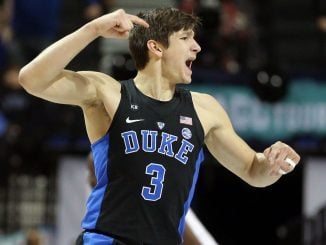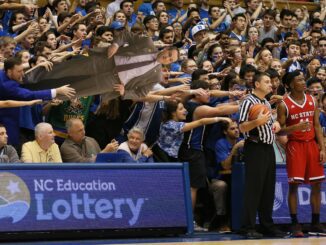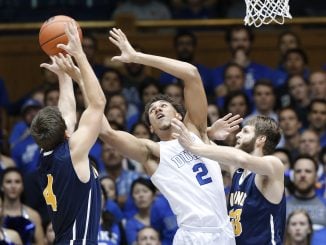
Free football isn’t always free.
As the Carolina Panthers drove downfield for a game-tying touchdown and two-point conversion in the final minute of play on Sunday, one thing became clear: I wasn’t getting back to Atlanta in time for first pitch.
That ship likely sailed before the game went to overtime. To pull off the Panthers/Braves two-fer, I needed the NFL game to be a blowout, in one direction or the other. That would clear out the stadium, and, more importantly, the roads around it, allowing me to make a smooth getaway and possibly make the 7:37 p.m. first pitch.
Instead, the game was close and long, and everyone stayed in a road-clogging mass.
This is life as a sportswriter, especially in October. I’m often asked about rooting for teams (and accused of bias against the team the angry fan accusing me roots for). But the truth is, sportswriters root for the result that will make their travel plans easier.
For instance, two days earlier I was rooting for the Dodgers to defeat the Giants in the deciding game of their divisional series. If the Dodgers won, their NLCS with the Braves would start in Atlanta, meaning they wouldn’t conflict with the ALCS games in Boston — and I could cover both. So for one night only, I loved L.A.
October is a tough month for sportswriters because it’s the start of The Overlap. Football season is still going strong, and everyone has settled into their weekly routine of press conferences, injury reports, games and aftermath.
When October arrives, basketball practice begins, meaning another set of press conferences and midnight madnesses, followed by exhibition games. One full-time job becomes two.
For some of us lucky enough to be approved, the MLB postseason adds another wrench to the season of The Overlap. After getting back from basketball media day in Charlotte, I had two days to get my affairs in order before my epic road trip began.
In 42 hours, I would cover three sporting events in three different sports in three different cities. ‘Why?’ you might ask — because the freaking Panthers’ game went to overtime. Otherwise, it would have been four sporting events in a 46-hour span.
This isn’t the first time I’ve done this. As I said earlier, this is life as a sportswriter. Yes, we get to cover big events — get in for free, get fed, and get to talk to coaches and athletes that people idolize. But it also means pulling an Atlantic City-Detroit-Buffalo, or Washington-Bronx-Charlotte tripleheader in a three-day span (I’ve done both.) It means starting an interstate road trip at close to midnight, waking up a Motel 6 desk clerk to check in for a few hours and spending more time driving to and from Atlanta than you do in the state of Georgia.
This trip actually wasn’t that bad because I got to start on home turf — Friday night in Durham for Duke’s Blue-White game that tips off the basketball season. By the time postgame interviews were done, I was able to leave Cameron Indoor a little before 11 p.m. I filled up the tank on the way home and checked my tire pressure to see if any needed to be topped off. After all, I had to get up early on Saturday to drive to Atlanta.
The Braves game didn’t start until 8:07 p.m., but covering MLB is funny. Not the “haha” kind of funny, but “the first pregame press conference is at 3:30” kind of funny.
I arrived in time, although there was some drama with parking. The first lot I pulled in was within view of the stadium. The parking attendant said to pay at the machine. As I walked toward it, a group of people huddled next to another parked car called over to me.
“You’re paying for parking?” one asked.
I said that’s what I’d been directed to do, and I really didn’t want to get towed.
“So you’re paying?”
“Yes.”
“150 dollars?”
“What now?”
Needless to say, I left that lot. I found a sketchy motel about a mile and change away. It looked like I could stay there for an entire week for less than $150. Sure enough, they had a sign posted near their door: “Event parking, $20 and up.”
As an out-of-town media, I was sent to the Aux Box — the auxiliary press box, usually located in some corner of the stadium, far from the main press box behind home plate. Atlanta decked out the Hank Aaron Terrace club for out-of-town media, allowing us to watch from a suite located directly behind the left field foul pole.
The Braves won in a walk-off, avoiding extra innings (take a note, Panthers). After the postgame, I made the long walk to my car and drove north. After about an hour, I found a cheap motel — it was only about 1 a.m., so I didn’t have to wake up the clerk, but I got the last room and she had to move her car to give me a spot to park.
The next morning, I got up bright and early to drive the rest of the way to Charlotte for Panthers-Vikings, still holding out hope of getting back to Atlanta for Game 2. When free football cost me that opportunity, I instead headed back to the Triangle to finish leg one. The grand total: 830 miles of driving.
Now it’s time to rest up.
After all, I’m headed to Boston this week for the ALCS.



